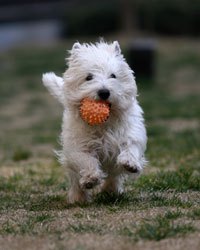
Barbecue Safety Tips
Never leave alcoholic drinks unattended where pets can reach them. Alcoholic beverages have the potential to poison pets. If ingested, the animal could become very intoxicated and weak, severely depressed or could go into a coma. Death from respiratory failure is also a possibility in severe cases.
Do not apply any sunscreen or insect repellent product to your pet that is not labeled specifically for use on animals. Ingestion of sunscreen products can result in drooling, vomiting, diarrhea, excessive thirst, and lethargy. The misuse of insect repellent that contains DEET can lead to neurological problems.
Always keep matches and lighter fluid out of your pets’ reach. Certain types of matches contain chlorates, which could potentially damage blood cells and result in difficulty breathing, or even kidney disease in severe cases. Light fluid can be irritating to skin, and if ingested can produce gastrointestinal irritation and central nervous system depression. If lighter fluid is inhaled, aspiration pneumonia and breathing problems could develop.
Keep your pets on their normal diet. Any change, even for one meal, can give your pets severe indigestion and diarrhea. This is particularly true for older animals that have more delicate digestive systems and nutritional requirements. And keep in mind that foods such as onions, chocolate, coffee, avocado, grapes, raisins, salt, and yeast dough can all be potentially toxic to companion animals.
Do not put glow jewelry on your pets or allow them to play with it. While the luminescent substance contained in these products is not highly toxic, excessive drooling and gastrointestinal irritation could still result from ingestions, and intestinal blockage could occur from swallowing large pieces of the plastic containers.
Keep citronella candles, insect coils, and oil products out of reach. Ingestions can produce stomach irritation and possibly even central nervous system depression. If inhaled, the oils could cause aspiration pneumonia in pets.
Never use fireworks around pets! While exposure to lit fireworks can potentially result in severe burns and/or trauma to the face and paws of curious pets, even unused fireworks can pose a danger. Many types contain potentially toxic substances, including potassium nitrate, arsenic, and other heavy metals.
Loud, crowded firework displays are no fun for pets. Please resist the urge to take them to festivities. Instead, keep your little guys safe from the noise in a quiet, sheltered, and escape-proof area at home.
Sun Exposure in Dogs and Cats
Dogs and cats with sparse hair or light colored hair and skin are more susceptible to sun related diseases. Sunburn is painful in animals just as in people, and it is recommended to keep your pet out of the sun especially during the summer from 10am to 4pm, when the sun is at its’ strongest. Dogs don’t have to be kept inside as long if you have shaded areas in the yard.
There are numerous cancers that can affect the skin of animals and most are related to sun exposure. Sunscreen can be used on animals but may be difficult to be used on the really hairy areas. Also, you must be careful the pet does not lick the sunscreen as it could be hazardous.
Although many treatments are available for skin disease, prevention is much easier and less expensive. If your dog develops a skin lesion, contact your vet as some of these conditions can be serious.
